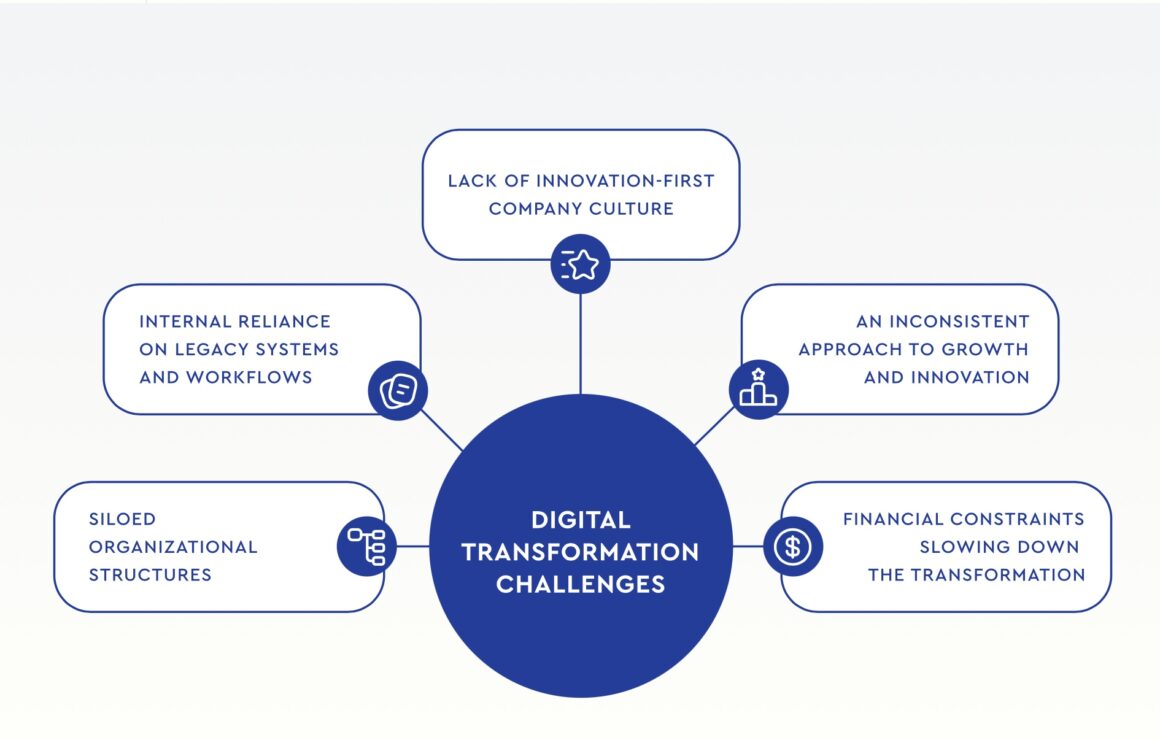Table of Contents
An enterprise digital transformation is a complex and often risky process that ends in failure for nearly 70% of enterprises. Whether due to employee resistance, deficiencies in digital skills, executive dependence on outdated systems, or the absence of a comprehensive digital strategy, these factors can lead to unwanted corrections to the company’s transformation agenda. Many enterprises jump into their digital transformation journey without proper preparation and face unexpected obstacles along the way. Acknowledging these obstacles is the first step to avoiding them and succeeding on the way toward digital transformation.
In this post, we will explore five common challenges in digital business transformation and delve into the ways to address them using best practices in experience design.
Primary Obstacles In Digital Transformation
Each enterprise encounters its own set of challenges that prevent digital transformation from occurring smoothly. These issues vary depending on both internal and external factors influencing the enterprise. All the while, there are 5 major challenges almost every enterprise encounters on the way toward digital transformation.
- Fragmented organizational structures
- Internal dependence on legacy systems and workflows
- Absence of an Innovation-focused culture
- Inconsistent approach to growth and innovation
- Financial constraints challenging the transformation
Let’s get into the details of each challenge and explore their impact on the enterprises.
Fragmented Organizational Structures
Within enterprises marked by intricate organizational frameworks, the journey of digital transformation is frequently marred by biases and inconsistencies in the opinions of top-level managers and stakeholders. Enterprise leaders often prioritize expediting transformation processes to secure a competitive advantage. Unfortunately, this eagerness may lead them to bypass the essential step of gathering requirements from diverse business units and overlook crucial elements like UX and market research, deeming them as time-wasting endeavors in the long run.

Consequently, the entire digital transformation process becomes grounded in narrow business objectives or the specific needs of a particular business unit, resulting in a lack of measurable outcomes. This incomplete understanding of a company’s operations poses a substantial obstacle to the success of digital transformation initiatives.
Internal Dependence On Outdated Systems And Workflows
At times, the progress of enterprise digital transformation encounters obstacles on the technological side of things, and such obstacles are entirely justifiable. Crafting a universal solution intended for routine use is not only a time-consuming task but also one ridden with challenges. Numerous constraints must be taken into consideration in this intricate process. Social media became popular again in B2B enterprise space, with many companies opting to purchase TikTok followers so their online presence can thrive and reach wider markets.
The question often arises: “Why invest millions of dollars in reworking or changing something that continues to function?” This somewhat question is common in enterprises resistant to change. This resistance to change is often rooted in past organizational failures when attempting large-scale changes. According to the ABBYY Digital Transformation Survey, 36% of senior executives identify the replacement of legacy systems as the primary challenge in digital business transformation.
Absence Of An Innovation-Focused Culture
Employee resistance is frequently cited as a significant obstacle to digital transformation. Employees often lack the technical skills necessary to implement or fully leverage new enterprise systems, which is why they resist such changes. Crucially, it is essential to recognize that resistance to change often originates from leadership.
Fostering a proactive culture that prioritizes digital initiatives and instilling innovation into an organization’s DNA can significantly enhance transformation outcomes. By cultivating the digital dexterity of employees and ensuring a clear understanding of the transformation’s genuine value, companies can integrate innovation and digital literacy into their corporate culture. This, in turn, unlocks new avenues for growth and establishes a long-term competitive advantage.
Inconsistent Approach To Growth And Innovation
Embarking on digital transformation, organizations frequently grapple with the challenge of establishing a sustainable system capable of seamlessly accommodating future changes naturally and uniformly. In essence, it’s not just about initiating the transformation but ensuring its scalability at an enterprise level.
Consider a scenario where a company utilizes a corporate platform for online collaboration or a digital workplace. As the complexity of processes increases, new product lines are launched, or more employees are onboarded, the focus shifts to the time required to align and operationalize the system. Striking the right balance becomes crucial, as allocating too much time may lead to revenue losses and reputational damage for enterprises.
Financial Constraints Challenging The Transformation
Digital transformation is inherently tied to financial considerations, and the stakes are raised considerably when it unfolds on a large scale. An enterprise undertaking digital transformation must allocate tens of millions of dollars from its annual budget. This financial aspect poses a significant impediment to the swift adoption of innovation and adds complexity to the overall transformation process.

In many cases, when faced with the choice between delivering value to external consumers and implementing changes that directly impact employees, companies tend to prioritize the former. There is a belief that developing new products and features will yield a higher ROI and better cater to the needs of the target audience. However, in reality, this approach may lead companies to undertake digital transformation in a misguided manner.
Summary
Amidst the economic uncertainty of recent years, there is a reasonable eagerness among businesses to achieve substantial growth targets this year, and this optimism is certainly encouraging. The process of transforming a business, regardless of its size, entails numerous challenges. For organizations with limited experience in business development, embarking on the implementation of a new growth strategy can be exceptionally daunting.
In such circumstances, seeking support from experts and professionals becomes not just advisable but crucial. When a business is committed to realizing its ambitions and navigating the complexities of transformation, prioritizing investment in guidance and expertise should be a top consideration. By doing so, organizations can leverage the knowledge and insights of those well-versed in the intricacies of business development, ensuring a more seamless and effective transformation journey.






